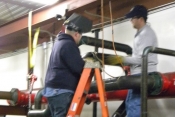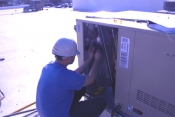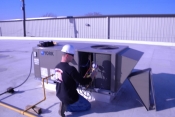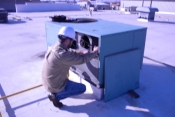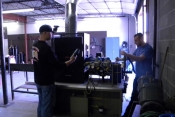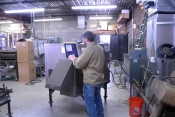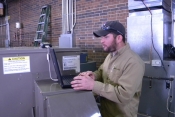HVACR Service Technician
A service technician's work covers the general responsibilities for heating, ventilation, air conditioning and refrigeration (HVACR). Here at Local 441 this would include the installation and maintenance of all sizes of heating and cooling systems for residential, commercial, institutional and industrial applications. Some job specific applications include complete gas piping installations, high voltage electrical components, testing and analyzing and start-up of systems. As a HVACR Service Technician we also believe that good customer relation skills become essential in providing the customer with a positive and informative visit.
ATTENTION!!! New EPA Regulations Go into Effect
Effective January 1, 2017
Changes to the EPA’s Section 608 go into effect. Additional changes will be phased in over the next two years.
CFC, HCFC, HFC and HFO Reclaimed refrigerants may not be resold unless it has been reclaimed by a certified re-claimer.
Effective January 1, 2018
The sale of CFC, HCFC, HFC and HFO Virgin refrigerant’s is restricted to technicians certified under EPA Sections 608 and 609.
Note: The EPA is allowing the continued sale of small cans, two pounds or less of refrigerants intended for use in MVAC systems and equipped with a self-sealing valve. However, this exception is limited to DIY- ers who perform work without monetary compensation.
Wholesalers must keep invoices that indicate: purchaser name, sale date, and the quantity of CFC, HCFC, HFC and HFO refrigerants purchased. These records must maintain for no less than three years.
Note: The EPA is allowing the continued sale of exempt substitutes (Natural Refrigerants).
Employers must maintain Proof of Certification for Technicians must maintain a copy of their certification at their place of business and maintain them for three years after a certified individual leaves the employer.
Technicians must pass must be certified in order to maintain, service, repair, or dispose of appliances containing CFC, HCFC, HFC and HFO refrigerants.
The EPA has developed new certification exam questions reflecting the new rules. The new exam is scheduled for pilot testing during the first quarter of 2017. Upon final review, the EPA will release the new certification exam questions to the ESCO Institute and other approved certification organizations.
The EPA requires new wording on the new certification cards, which will result in all new and replacement certification cards having a new look.
The new wording includes: “[Name of person] has successfully passed a [Type I, Type II, Type III, and/or Universal, as appropriate] exam on how to responsibly handle refrigerants as required by EPA’s National Recycling and Emission Reduction Program.”
Currently certified Section 608 technicians do not need to be re-certified.
New recordkeeping requirements for appliances containing 5 to 50 pounds of refrigerant become effective. Technicians must keep records of; the location, date of recovery, and type of refrigerant recovered for each disposed appliance, the quantity of refrigerant by type recovered from disposed appliances in each calendar month. In addition, the quantity of refrigerant, and type, transferred for reclamation or destruction, the person to whom it was transferred, and the date of the transfer.
All requirements for the maintenance, service, repair and disposal of CFC and HCFC are extended to HFC and HFO refrigerants.
Effective January 1, 2019
Section 608 includes new leak inspection and verification test requirements for owners/operators.
Leak inspections are required for appliances that have exceeded the applicable leak rate, according to the schedule below. All visible and accessible components of an appliance must be inspected, using a method or methods that are appropriate for that appliance.
• Comfort Cooling with a charge of 50 or more pounds must have a leak inspection once per calendar year until the owner/operator can demonstrate through the leak rate calculations that the leak rate has not exceeded 10% for one year.
• Commercial Refrigeration and Industrial Process Refrigeration (IPR) with a charge of 50 to 500 pounds must have a leak inspection once per calendar year until the owner / operator can demonstrate through the leak rate calculations that the leak rate has not exceeded 20% commercial refrigeration or 30% IPR for one year.
• Commercial Refrigeration and IPR with a charge of over 500 pounds must have a leak inspection conducted once every three months until the owner/operator can demonstrate through leak rate calculations that the leak rate has not exceeded 20% for commercial refrigeration or 30% IPR for four quarters in a row.
EPA to present new Section 608 Regulations
Get the facts directly from the source, ESCO Institute has arranged for Jeremey Arling of the EPA to present the new Section 608 regulations at the National HVACR Educators and Trainers Conference in Orlando, Florida, March 27-29, 2017.
This is an opportunity to hear from Mr. Arling, chief author of the new regulation. He will discuss the changes at his Keynote presentation. Mr. Arling will be available to answer questions at the exposition directly following the General Session.
Questions
Visit www.escogroup.org where "EPA Section 608 Update" link is posted. The link provides access to the complete ruling, and a printable summary to share with others.
Registered proctors with questions are encouraged to call 1-800-726-9696 to learn more about the new regulations and exam.


